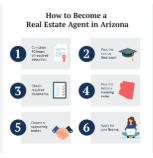Introduction
The real estate industry offers a dynamic and rewarding career path, but before you can start helping clients buy and sell properties, you’ll need to obtain your real estate license. While the process varies slightly from state to state, there are common steps you can follow to ensure a smooth journey toward licensure. In this guide, we’ll walk you through exactly how to get a real estate license, share insider tips, and highlight key resources to help you succeed.
Step 1: Understand Your State’s Licensing Requirements
Every U.S. state sets its own rules for becoming a licensed real estate agent. Requirements can differ in terms of education hours, fees, and eligibility.
Key factors to check in your state:
- Minimum age (usually 18 or 19 years old)
- High school diploma or GED requirement
- Number of required pre-licensing education hours
- State-specific background check or fingerprinting
- Application and exam fees
💡 Tip: Visit your state’s official real estate commission website to get the most accurate and up-to-date information.
External Source: National Association of Realtors – State Licensing Requirements
Step 2: Complete the Required Pre-Licensing Education
Most states require aspiring agents to complete 60 to 150 hours of pre-licensing coursework. These classes cover essential topics like:
- Real estate principles and practices
- Contracts and property ownership
- Real estate law and ethics
- Financing and appraisals
Study Options:
- In-person classes at real estate schools or community colleges
- Online courses for flexible scheduling
When choosing a school, make sure it’s state-approved so your hours count toward your license.
Step 3: Pass the Real Estate Licensing Exam
Once you’ve completed your coursework, you’ll need to pass your state’s real estate exam. The test typically consists of two parts:
- National Portion – Covers general real estate principles.
- State Portion – Focuses on local laws and regulations.
Tips for Exam Success:
- Use official practice tests
- Review your state’s candidate handbook
- Focus on vocabulary and key legal concepts
Most exams are multiple-choice and taken at a testing center or online with a proctor.
Step 4: Submit Your Licensing Application
After passing the exam, you’ll submit your license application to your state’s real estate commission. This step usually involves:
- Providing proof of education
- Submitting exam results
- Completing a background check
- Paying the application fee (often $50–$250)
Processing times vary, so it’s best to submit your application as soon as possible.

Step 5: Choose a Sponsoring Broker
In most states, new agents must work under a licensed broker before they can conduct real estate transactions. Your broker will:
- Provide training and mentorship
- Offer access to MLS (Multiple Listing Service)
- Guide you through your first deals
Questions to ask when choosing a broker:
- What is the commission split?
- Are there desk or monthly fees?
- Do they offer marketing support and training?
Step 6: Activate Your License and Start Your Career
Once your application is approved and you’ve chosen a broker, your license will be activated. Now you can officially:
- Represent buyers and sellers
- Earn commissions
- Grow your client network
Consider joining professional organizations like the National Association of Realtors (NAR) to enhance credibility and access exclusive resources.
External Source: National Association of Realtors
Additional Tips for Success
- Continue Your Education: Many states require continuing education (CE) courses to renew your license every 1–2 years.
- Invest in Marketing: Build an online presence through social media and a professional website.
- Network Consistently: Attend local events, join real estate groups, and maintain client relationships.
Internal Resources You Might Like
Conclusion
Getting your real estate license is a structured but rewarding process that opens the door to a potentially lucrative career. By understanding your state’s requirements, completing pre-licensing education, passing the exam, and joining a supportive brokerage, you’ll be well on your way to success in the property market. The sooner you start, the sooner you can begin helping clients achieve their real estate dreams.